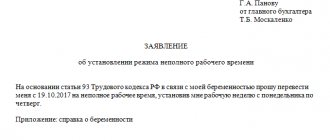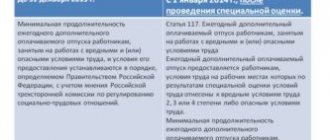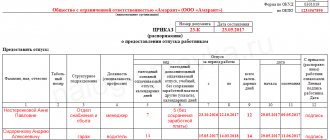What does shift work mean?
The rules for establishing a shift work schedule at an enterprise are prescribed in Article 103 of the Labor Code of the Russian Federation. This schedule implies the organization of work with:
- the duration of the production process is more than the normal duration of the working day;
- organizing more appropriate use of machinery, equipment, and production space;
- the need to increase production volumes;
- organizing round-the-clock operation of trade or public service facilities;
- other production factors.
Work can be organized in two, three or four shifts. At the same time, working for two shifts in a row is prohibited.
Additional payment for evening hours labor code
Subparagraph b of paragraph 9 of Resolution of the Council of Ministers of the USSR dated February 12, 1987 No. 194 “On the transition of associations, enterprises and organizations of industry and other sectors of the national economy to a multi-shift mode in order to increase production efficiency” to workers, foremen, managers of sites and other departments, specialists and Employees working in two- and three-shift modes in associations, enterprises and organizations of industry, construction, transport and communications, as well as in the processing industries of the agro-industrial complex, are given an additional payment for the evening shift in the amount of 20 percent.
With this mode, the evening shift will be from 14 to 22 hours. What additional payment is due for working on the evening shift? The amounts of such additional payments cannot be lower than those established by law. Thus, the additional payment for work on the evening shift is established in subparagraph “a” of paragraph 9 of the resolution of the Central Committee of the CPSU, the Council of Ministers of the USSR and the All-Russian Central Council of Trade Unions dated February 12, 1987 No. 194 in the amount of 20 percent of the hourly tariff rate (official salary) for each hour of work.
Remuneration for shift work: features
As a rule, a company with a shift schedule establishes a summarized recording of working hours. Its peculiarity is that labor standards are determined within the accounting period: month, quarter or year. And the salary is calculated based on the tariff rate determined for this period.
Pay per shift is also calculated based on the hourly wage rate multiplied by the number of hours in the shift.
Example.
Semenov S.S. The salary is set at 40,000 rubles. The company has established a summarized recording of working hours. In March, all scheduled hours were worked (159 hours). The accounting period is 1 year (according to the production calendar, this is 1970 hours).
Salaries in different months may differ due to the different number of working hours in them.
The use of summarized accounting for shift workers is not mandatory. The organization has the right to establish another form of payroll, for example, time-based, based on salary. Payment for a shift work schedule with salary will be calculated in the usual manner. That is, if the working hours are fully worked according to the schedule, the employee will be paid the salary in full:
What is night work and how is it paid?
According to Art.
96 TK, night time is considered to be from 22.00 to 6.00 am. Work during this period is recognized as night work. The employment contract specifies working hours; the employee signing the contract additionally signs his consent to work at night. According to Article 154 of the Labor Code, an employee working during the specified time period can count on additional payment for each hour of work. This article refers to Government Decree No. 554 of July 22, 2008, which states that the minimum additional payment is 20% of the hourly rate or salary calculated for 1 hour. The executive body has set a lower limit beyond which employers have no right to go. But the upper limit may be higher if it is approved in:
- Collective agreement;
- In a local act of a specific organization;
- In the employment contract.
That is, organizations themselves can increase additional payments to their employees. We are talking about an additional payment for the watches themselves, and not for quality characteristics; for example, the additional payment is not affected by how much the employee produced.
Payroll for holidays and weekends
The calculation of wages for the performance of work duties on weekends has a number of features. This is due to the fact that with a shift schedule, days off may not be the traditional Saturday and Sunday, but other days. In this case, Saturday and Sunday can be working days. In this case, wages for these days will be calculated as usual, and no increased rate will be applied.
But if the working day of the shift falls on an official non-working holiday, then the shift worker must be paid at an increased rate: based on the double tariff rate.
Example.
Let's return to our example. Let's assume that Semenov S.S. worked on March 8 for 8 hours. Then he should have been paid:
Instead of double payment, the employee can, at his request, be given an additional day of rest. In this case, shifts on holidays are paid at a single rate.
Example of compensation calculations for night work
Night work hours according to the Labor Code of the Russian Federation in 2021 are shorter than the standard day by 1 hour. Sometimes situations arise that make the time even shorter:
- Article 92 of the Labor Code establishes that if an employee works less than 8 hours a day and the working week does not exceed 36 hours, then the shift must be shortened to fit into the norm.
- If an employee works only at night, the number of work shifts and their duration are included in the contract.
- If the organization has 6 working days per week.
- If required to fulfill obligations.
Teenagers work with shortened working hours, but they are prohibited from being involved in night shifts. Disabled people and workers in hazardous industries have the right to leave after 10 pm, but only with their written consent.
According to Article 154 of the Labor Code, an employee working during the specified time period can count on additional payment for each hour of work. This article refers to Government Decree No. 554 of July 22, 2008, which states that the minimum additional payment is 20% of the hourly rate or salary calculated for 1 hour. The executive body has set a lower limit beyond which employers have no right to go.
But the upper limit may be higher if it is approved in:
- Collective agreement;
- In a local act of a specific organization;
- In the employment contract.
That is, organizations themselves can increase additional payments to their employees. We are talking about an additional payment for the watches themselves, and not for quality characteristics; for example, the additional payment is not affected by how much the employee produced.
Is there an additional payment for working in the evening (from 18 to 22 hours)? The evening shift is the one that immediately precedes the night shift. Evening conditions are a deviation from normal working conditions and require increased pay. Additional payments for work on the evening shift related to the regime and working conditions are compensatory payments, defined as payments for work that deviates from normal, and are subject to increased payment.
Additional payment for the evening shift is included in the organization's expenses for profit tax purposes (see Terms of payment for evening and night work hours. An additional 35% is paid to: railway and metro workers; employees working on river ships; housing and communal services workers; trade and public catering workers; employees motor transport companies, in the absence of shifts; employees of security, paramilitary, and fire protection.
The minimum amount of additional payment for night work is determined by a decree of the Government of the Russian Federation (). It is 20 percent of the hourly rate or salary (calculated in terms of an hour of work) for each hour of work at night. The same document, as well as Article 96 of the Labor Code, determines that night time is considered to be the period from 22:00 to 6:00. () post.
Terms of payment for evening and night work hours Additional payment of 35%: to railway and metro workers; workers working on river ships; housing and communal services workers; trade and catering workers; employees of motor transport companies, in the absence of shifts; workers of guard, paramilitary, fire protection. 2. 50% additional payment: to employees working at pasta enterprises. 3.
Important
The Labor Code of the Russian Federation does not contain a definition of the concepts “evening time” and “evening shift” and does not regulate the employer’s obligation to establish increased wages in the evening. Previously, additional payment for work in the evening shift was provided for by the Resolution of the Central Committee of the CPSU, the Council of Ministers of the USSR, the All-Union Central Council of Trade Unions dated February 12, 1987 No. 194 “On the transition of associations, enterprises and organizations of industry and other sectors of the national economy to a multi-shift operating mode in order to increase production efficiency.” This Decree has lost force in accordance with Decree of the Government of the Russian Federation dated April 28, 2011 No. 332.
In accordance with Art. 96 of the Labor Code of the Russian Federation, the time from 22 pm to 6 am is considered night time. In order to reduce the unfavorable factors of working at night, there is a rule according to which the duration of work (shift) at night is reduced by one hour without further work.
Info
100% additional payment:
- workers of bakeries, flour and cereal production enterprises.
There is an explanation of the State Committee for Labor of the USSR and the Secretariat of the All-Union Central Council of Trade Unions No. 294/14-38 dated 05/07/1987, which states that if work at an enterprise is organized in several shifts, with a duration established by law, and more than half of the shift occurs at night, then all of it considered nocturnal. Accordingly, employees can receive additional payment not for night hours. Almost all of the exceptions described above are enshrined in acts from the times of the USSR.
Attention
They are valid because no regulatory acts replacing them have been issued in Russia, and they have not been officially repealed. Some points related to payment for night work Many employers who engage an employee to work on non-working holidays and weekends do not want to pay extra for night work, citing Article 153 of the Labor Code.
Article 154 of the Labor Code of the Russian Federation establishes that each hour of work at night is paid at an increased rate compared to work under normal conditions, but not lower than the amounts established by laws and other regulatory legal acts. We are introducing a multi-shift operating mode at the enterprise 149 of the Labor Code of the Russian Federation; such payments must be made in the amount established by labor legislation and other regulatory legal acts containing labor law norms, a collective agreement, agreements, local regulations, and an employment contract. Such a regulatory legal act is the Resolution of the Central Committee of the CPSU, the Council of Ministers of the USSR and the All-Union Central Council of Trade Unions of February 12, 1987.
Important
We suggest you read: What should a gun safe be according to the law?
Additional payment to the employee for work from 6 to 8 o’clock in the amount of 240 rubles. (1200 rubles – 960 rubles) is not recognized as an economically justified expense and is not taken into account for profit tax purposes. If an organization uses summarized recording of working hours for certain categories of employees (for example, drivers, security guards), where part of the working day (less than half) falls on night hours and the work is not shift work and is not a six-day period, then night hours should be taken into account separately.
And that's why. As you know, the Labor Code of the Russian Federation requires payment for each hour of work at night at an increased rate compared to work under normal conditions in the amount of at least 20% of the hourly tariff rate (hourly part of the salary). However, there is no direct indication in the Labor Code of the Russian Federation that it is necessary to establish separately additional payments for night work and separately the tariff rate.
A different form and procedure for payment for night work will be a violation of labor legislation, namely, Art. 154 of the Labor Code of the Russian Federation and may entail administrative liability in accordance with Art. 5.27 Code of Administrative Offenses of the Russian Federation. Thus, it is impossible to consider increased wages for night work as part of the bonus.
It should be remembered that pregnant women and workers under 18 years of age, women with children under three years of age, disabled people, workers with disabled children, workers caring for sick family members are not allowed to work at night in accordance with medical certificate, mothers and fathers (guardians) raising children under the age of five without a spouse. According to Art.
According to Art. 96 TK, night time is considered to be from 22.00 to 6.00 am. Work during this period is recognized as night work. In the employment contract
working hours are written down; the employee signing the contract additionally signs his consent to work at night.
According to Article 154 of the Labor Code, an employee working during the specified time period can count on additional payment for each hour of work. This article refers to Government Decree No. 554 of July 22, 2008, which states that the minimum additional payment is 20% of the hourly rate or salary calculated for 1 hour.
Many employers who engage an employee to work on non-working holidays and weekends do not want to pay extra for night time, citing Article 153 of the Labor Code. But the effect of Article 153 of the Labor Code does not cancel the effect of Article 154 of the Labor Code, therefore, the employer must pay for work on holidays and for night time. 20% should be calculated from the regular salary, and not from the salary with increased rates.
If you work not under an employment contract, but under a civil law contract, the norm of Article 154 of the Labor Code does not apply to you. The amount of payment will be determined by the contract, and the employee actually finds himself without compensation for unfavorable working conditions.
Recommendation No. 178, given by the International Labor Organization in 1990, contains a clause stating that compensation can be replaced by reduced working hours. Russia has not ratified this act, therefore the Labor Code does not contain such an alternative.
If you're paid hourly, it's easy to find out what your copay amount is. For example, if you earn 100 rubles per working hour, then when working at night, 20% of 100 rubles is added to this amount.
120 rubles x 8 hours = 960 rubles (total additional payment was 160 rubles);
Another case: for example, you receive a fixed payment of 20,000 rubles per month, working 22 days for 8 hours. Of the bottom 6 days you worked at night. You need to find out what compensation is due in this example.
20,000 rubles/22 days=909.1 rubles.
909.1 rubles X 20% = 181.82 rubles.
The employee will receive 181.82 rubles X 6 days = 1091.1 rubles in compensation for going to work at night.
When giving your consent to night work, remember:
- Night work from 22.00 to 6.00 is paid additionally 20% of your rate or salary.
- For certain categories of employees, the additional payment can reach 35%, 50%, 75% and even 100%;
- If you work under a civil contract, you are not entitled to this compensation;
- The additional payment cannot be replaced by reduced working hours;
- The additional payment for night work is not canceled if the employee was involved in work on weekends and holidays: then both compensations are summed up.
How are “donor days” paid when working shifts?
In general, the donor is provided with two paid days of rest:
- day of blood donation;
- the day after donating blood.
The second day can be used immediately, or can be transferred to another working day or added to annual leave. During the rest period, the donor retains his average earnings.
But all this is true for a normal working day (8 hours). Rostrud spoke about “donor” vacation and its payment back in 2012 (Letter 402-6-1 dated March 20, 2012). The agency believes that the donor should be given 8 hours of rest. If the shift is longer (for example, 12 hours), then the employee will be required to work hours in excess of eight on another workday. And in Letter 14-2/OOG-1727, the Ministry of Labor clarified that the donor only needs to pay for 8 working hours, regardless of the actual duration of the shift.
Evening shift period according to the labor code
Accordingly, the administration must ensure separate accounting of night hours worked by each employee. This will be required both for the ease of calculating surcharges and for providing the necessary information at the request of regulatory authorities.
For example, during an inspection by the labor inspectorate (scheduled or at the request of an employee). The employer must take into account that there are a number of categories of workers who cannot be involved in night work. All of them are listed in Article 96 of the Labor Code of the Russian Federation.
There is also a category of workers who can be involved in night work only with their written consent (also see Article 96 of the Labor Code of the Russian Federation). In this case, these employees must be informed in writing of the possibility of their refusal to work at night.
When calculating additional payment for night work to piece workers, the procedure for applying it remains the same as for time workers.
Payment for work in the evening and at night
Labor consultant Legislatively, the amount of additional payment for night work is set at no less than 20% of the salary or tariff rate, but in practice the additional payment is usually 40%. The fact is that until 2008, some Soviet-era regulations continued to be in force, and this payment figure appeared there.
But let's look at the question in more detail. From time immemorial, the rhythm of human life is such that the greatest activity occurs during the daytime. At night, there comes a period of recuperation, time for sleep and rest.
Over many thousands of years of evolution, the body has adapted to this regime, determined by the change of day and night.
Payment for night hours according to the Labor Code of the Russian Federation in 2021, example of calculation
The bonus payable to employees working night shifts must be at least 20%. A more precise value is established in an individual organization. According to statistics, on average this figure is around 40%. For example, increased values apply to the following categories of workers:
Citizens belonging to the listed categories of employees may be required to work at night if there are no medical contraindications, and there is also the voluntary consent of the employees themselves in writing. This means that these persons’ refusal to work at night cannot be charged as absenteeism.








